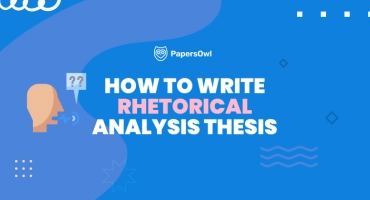How to Write a Thesis Statement
Table of contents
An academic paper’s main argument and the logic that follows it are both defined by a clear, focused thesis statement. A lot of students find this step hard because a good thesis needs to be short, clear, and open to debate so that it can lead to useful analysis.
While professional online essay writer services can assist with crafting polished academic work, understanding how strong thesis statements function remains essential for developing credible and coherent writing.
In actuality, a strong thesis arises from addressing a key question, honing that response into a precise assertion, and making sure it represents a viewpoint that stimulates debate. Strong thesis statements demonstrate clarity, focus, and argumentative depth, whereas weak ones tend to be vague, overly broad, or merely descriptive. Writers who master this skill avoid common pitfalls, revise strategically, and use their thesis to unify the structure and content of the entire paper.
Ultimately, an effective thesis statement not only communicates the writer’s stance but also strengthens the overall quality, coherence, and impact of the academic work.
What is a Thesis Statement in Academic Writing?
A thesis statement is the central claim that shapes and directs any academic paper. It functions as the backbone of the text, presenting the main argument and clarifying what readers should expect in the discussion that follows. Positioned typically at the end of the introduction, a thesis statement establishes the writer’s stance, defines the scope of the paper, and signals how the key points will be developed.
A strong thesis articulates the core idea and engages the reader by presenting a focused, arguable position. It ensures coherence by anchoring all subsequent arguments to a single, unified line of reasoning. Without a clear and persuasive thesis statement, a paper risks becoming unfocused, fragmented, or unconvincing.
Because of its structural importance, the presence of an effective thesis statement should be one of the first elements you evaluate—particularly if you choose to pay someone to do my essay. A well-crafted thesis is a reliable indicator of the overall quality, clarity, and integrity of academic writing.
Components of a Strong Thesis Statement
Understanding how to write a strong thesis statement starts with recognizing the core features that distinguish an effective claim from a weak or unfocused one. A strong thesis consistently demonstrates three essential components:
- Clear and Concise Expression of the Main Argument. A strong thesis condenses the central argument into a single, direct sentence. This clarity ensures that readers immediately understand the writer’s position and the overall direction of the paper. Concise expression enhances the statement’s impact and eliminates ambiguity.
- Specificity and Focus on a Single Idea. Effective thesis statements avoid broad generalizations and vague assertions. Instead, they articulate a precise, narrowly defined claim that directs the development of the argument. By focusing on one clearly identifiable idea, the writer maintains coherence and prevents the discussion from drifting.
- Debatable Nature and Capacity to Invite Discussion. A strong thesis presents a claim that can reasonably be challenged. Its argumentative nature encourages critical engagement, prompting readers to consider alternative viewpoints. A debatable thesis not only strengthens the intellectual depth of the paper but also enhances its persuasive value.
Manual on Writing Thesis Statements
Understanding how to craft an effective thesis statement is essential for producing clear and persuasive academic writing. This step-by-step manual provides a practical framework for developing strong thesis statements that demonstrate analytical focus and academic rigor.
Step 1: Start with a Question
Begin by formulating a guiding or research question related to your topic. This question helps you identify the central issue your paper will address.
For example, if you are writing about the economic consequences of climate change, you might ask, “How does climate change impact the global economy?”
Establishing this question creates the foundation for your argument—whether you develop it independently or seek guidance from professionals such as those you might hire essay writers to consult.
If you are still exploring potential areas of inquiry, reviewing curated senior thesis topics can help you identify a strong research direction before crafting your thesis statement.
Step 2: Write Your Initial Answer
Next, draft a preliminary answer to your question. This first attempt should be concise and directly responsive to the issue at hand, even if it lacks detail at this stage.
For instance: “Climate change directly impacts the global economy.” This initial claim serves as a starting point for deeper refinement.
Step 3: Develop Your Answer
Expand your initial answer by adding reasoning, evidence, and illustrative examples. Consider the mechanisms, conditions, or consequences that support your claim.
For example: “The increased frequency of natural disasters caused by climate change undermines national infrastructure and reduces productivity, resulting in substantial economic losses and heightened resource demands.”
This development phase strengthens the logical basis of your thesis.
Step 4: Refine Your Thesis Statement
Finally, refine your expanded answer into a precise, assertive, and debatable thesis statement. A strong thesis clearly reflects your position and sets the direction for the entire paper.
For example: “The escalating impacts of global warming on the global economy can be mitigated only through coordinated policy efforts that compel governments, industries, and environmental stakeholders to reduce carbon emissions collectively.”
Types of Thesis Statements
A strong thesis statement presents a clear, specific, and debatable claim that guides the entire paper. Weak thesis statements, by contrast, tend to be vague, overly broad, or purely descriptive, leaving the reader without a coherent sense of direction.
A thesis’s focus and persuasiveness can be maintained by assessing its clarity, accuracy, and relevance. Below are the core types of thesis statements commonly used in academic writing, each serving a different purpose depending on the assignment.
| Type of Thesis Statement | Description | Example |
|---|---|---|
| Argumentative | Establishes a clear position on a debatable issue and outlines the reasoning behind it. | “High school students should not be required to wear uniforms because they restrict freedom of expression, fail to improve academic performance, and impose unnecessary financial burdens.” |
| Informative (Expository) | States the central idea of an explanatory essay without taking a stance. | “Scientific data consistently demonstrates that human activity contributes to rising global temperatures.” |
| Analytical | Breaks the subject into components and evaluates how they function together. | “In To Kill a Mockingbird, Harper Lee exposes structural racial injustice through the trial of Tom Robinson and the reactions of the community.” |
| Narrative | Conveys the main insight or lesson derived from a personal experience. | “Hiking the Pacific Crest Trail taught me that perseverance often develops only when circumstances feel impossible.” |
| Descriptive | Expresses the dominant impression or theme of a descriptive piece. | “The abandoned lighthouse evokes a striking sense of isolation that mirrors the region’s forgotten maritime past.” |
| Cause and Effect | Identifies a causal relationship between two conditions or events. | “Excessive social media use negatively affects students’ academic performance.” |
| Rhetorical Analysis | Explains how an author uses rhetorical strategies to achieve a specific effect. | “In his ‘Letter from Birmingham Jail,’ King employs ethical, logical, and emotional appeals to justify the urgency of civil rights action.” |
| Synthesis | Combines ideas from multiple sources into a unified analytical claim. | “Although experts disagree on the primary sources of urban pollution, cross-disciplinary evidence indicates that transportation reform has the greatest potential to reduce emissions.” |
| Research Paper | Presents a precise, evidence-based claim that the research will examine and support. | “Early childhood bilingualism enhances cognitive flexibility, as demonstrated across multiple developmental psychology studies.” |
| Literature Review | Synthesizes existing scholarship to highlight trends, gaps, or overarching insights. | “Current scholarship reveals a consistent lack of long-term data on the effectiveness of digital learning tools in early education.” |
| Persuasive Speech | Delivers a concise, action-oriented claim designed to influence the audience. | “Local communities must transition to renewable energy sources to reduce long-term economic risks and environmental damage.” |
Tips to Polish the Thesis Statement
Refining a thesis statement is a crucial step in ensuring that the paper maintains clarity, coherence, and argumentative strength. The following guidelines help elevate a thesis into a precise and authoritative claim.
1. Ensure Alignment with the Overall Argument.
The thesis must accurately reflect the central argument of the paper. It should be concise, focused, and representative of the key point you intend to defend or explore. If the thesis and the body of the paper do not align, the entire structure becomes unstable.
2.Check for Clarity, Precision, and Specificity.
A polished thesis communicates its message with no ambiguity.
- Clarity ensures that the idea is immediately understandable.
- Precision avoids vague or overly general wording.
- Specificity anchors the statement to a clearly defined issue, preventing the argument from drifting.
3. Integrate the Thesis Effectively in the Introduction.
In academic writing, the thesis is typically placed at the end of the introduction. After presenting context and establishing the relevance of the topic, the thesis functions as the clear assertion that sets the direction for the rest of the paper.
4. Let the Thesis Guide Structure and Content.
A strong thesis operates as the organizing principle of the essay. Each section of the paper should directly support or expand the central claim. Revisiting the thesis during drafting helps maintain cohesion and prevents digressions.
5. Revise and Iterate Throughout the Writing Process.
A thesis is rarely perfect on the first attempt. As the argument evolves, refine the statement to ensure it remains accurate, meaningful, and aligned with the evidence presented. Iterative revision strengthens both the argument and the overall clarity of the work.
Final Thought
Any academic paper’s defining component is its thesis statement, which gives the entire argument direction, clarity, and a cohesive goal. The writer creates a solid foundation that directs the essay’s reasoning and the reader’s comprehension of its purpose by clearly and succinctly stating the main point.
A clear thesis often evolves during the writing process, which is why understanding how to restate a thesis is equally important for maintaining coherence and refining your final argument.
A solid thesis serves as a road map for any kind of assignment, indicating the topic of discussion, defining the parameters of the analysis, and providing a foundation for all subsequent supporting arguments. It takes careful consideration, refinement, and a clear understanding of the position you want to defend to develop such a statement.
With thorough research and a well-considered perspective, you can confidently shape your argument—or decide to write my thesis paper with full awareness of what an effective thesis statement must accomplish.








